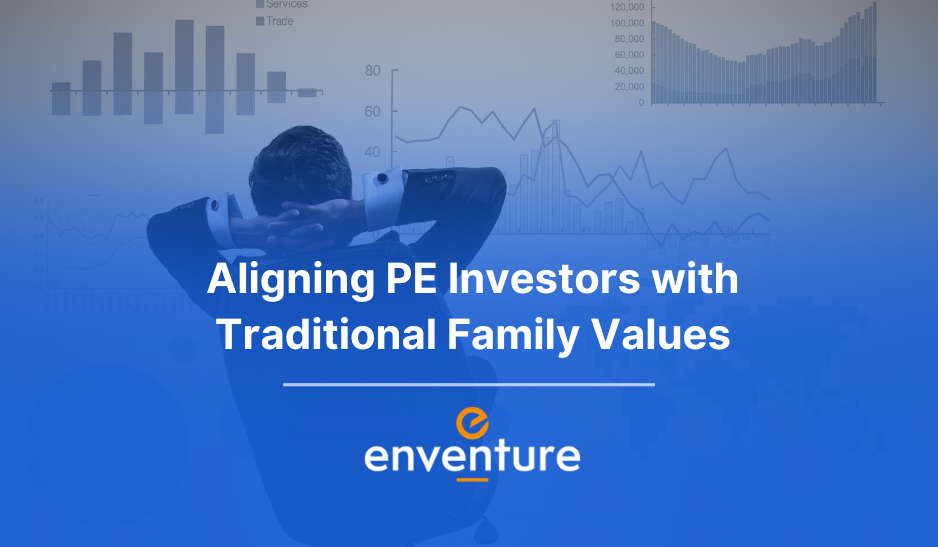Explore how private equity firms align with family business values in India and the U.S., bridging traditionalism with modern investment strategies.

Exploring the Cultural Challenges and Resolutions between PE Firms and Conservative Family Business Owners
In India and the United States, family-run businesses form the backbone of economic growth, employment, and generational legacy. But as these businesses look to scale, innovate, or pass the baton, private equity (PE) often becomes an attractive option for funding and transformation. However, this union is not always seamless. PE firms operate on performance metrics, governance frameworks, and short-to-medium-term ROI goals—while family businesses often prioritize legacy, relationships, loyalty, and long-held cultural practices.
Bridging this gap isn’t impossible—but it requires mutual understanding, trust-building, and cultural sensitivity. This article delves into the friction points between PE investors and family-led businesses, and how both sides are learning to align values for long-term success.
The Cultural Fault Lines: Where Worlds Collide
1. Control vs. Collaboration
Family business owners often struggle with the idea of sharing control. For generations, they’ve made decisions through intuition, family discussions, or the wisdom of elders. In contrast, PE firms expect structured governance, decision rights, and often, board-level influence.
“It’s not just about financial control—it’s emotional control too. You’re asking founders to give up a way of life.”
2. Long-Term Legacy vs. Exit Planning
Many Indian and American family businesses want to hand over their companies to the next generation. PE firms, however, often look at 5-7 year exit windows. This divergence in time horizons can create distrust unless carefully aligned through strategic conversations and co-created roadmaps.
3. Loyalty vs. Performance-Driven Culture
In family firms, long-serving employees are often considered “family.” Decisions are sometimes made out of loyalty rather than merit. PE firms bring a performance-based culture—including top-down restructuring, KPIs, and even leadership changes—which can be perceived as a threat to legacy and harmony.
4. Risk Appetite and Transparency
Family businesses, especially in India, tend to be risk-averse and discreet about finances. PE demands full transparency and often encourages risk-taking for scale—two qualities that can unsettle conservative promoters.
Building the Bridge: How PE Firms Align with Family Values
1. Creating Trust Through Education
Before negotiations even begin, successful PE firms educate family promoters about how PE works—not just the benefits but also the responsibilities. Clear communication about rights, obligations, and post-deal changes sets expectations early.
2. Flexible Deal Structuring
Innovative PE firms offer minority investments, structured exits, and family buyback clauses to ease control-related anxiety. By assuring families of continued involvement or phased transitions, they build comfort without compromising their investment thesis.
3. Cultural Sensitivity in Leadership Transition
Replacing a second-generation CEO with an external professional doesn’t have to feel like a takeover. Smart PE firms involve family stakeholders in succession planning, allow shadow periods, or even co-CEOs during transitions.
4. Institutionalizing Without Eroding Identity
Rather than dismantling the culture, PE firms that thrive in family businesses enhance internal processes while retaining the unique ethos. For instance, governance structures may be formalized, but festivals, rituals, or founder traditions may still be respected.
5. Involving the Next Generation
Many next-gen leaders in India and the U.S. are Ivy League or IIM educated, exposed to global best practices, and eager to scale. PE firms often align better with these successors, creating a bridge between tradition and modernity.
Cross-Cultural Examples
-
India: In Tier-2 cities, PE-backed firms like Senco Gold and Parag Milk Foods have managed to balance professionalization with traditional family values by retaining founders in key roles.
-
USA: Family-run Midwest manufacturing firms often partner with PE firms like The Riverside Company, which is known for its “founder-first” approach, preserving family voice in board decisions.
Final Thought
Private equity and family businesses aren’t inherently incompatible—they just speak different languages. When PE firms enter with empathy and family businesses respond with openness, this cultural convergence can unlock extraordinary value. The key lies not in replacing legacy, but in redefining it for the future.
Bold Moves,
Brighter Futures
Let's team up and make a difference.
Subscribe to our newsletter
Enventure is an exit-driven fund with high-yield opportunities in the healthcare, space, and green tech sectors across the US and India.
Mail Us
3103 Kewanee Ln,
Naperville, IL, 60564
Copyright © 2025 Enventure, all rights reserved.
